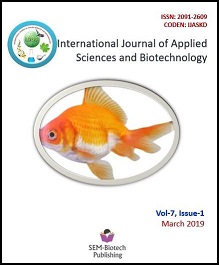Effect of Bitter Leaves Extract on Bacteria Isolated from Soils of Some Mechanic and non-Mechanic Sites in Makurdi Metropolis
DOI:
https://doi.org/10.3126/ijasbt.v7i1.23302Abstract
Effect of bitter leaves extract on bacteria isolated from soils of some mechanic and non- mechanic site in Makurdi metropolis was investigated. Forty (40) soil samples (20g each) were collected at the depth of 8-10cm from different mechanic shops in Makurdi metropolis (New garage, Kanshio and North bank) and soil from non-mechanic site. Fresh leaves of Vernonia amygdalina (bitter leaves) were purchased at Wadata market and identified at the Department of Plant Science, Federal University of Agriculture (FUAM). Serial dilution and pour plate technique was used for microbial analysis. Bacteria present were identified using cultural, morphological and biochemical techniques. Ethanol and methanol solvents were used to extract the bioactive constituents. Qualitative and quantitative phytochemical analyses were carried out on the bioactive components in the bitter leaves extracts. Susceptibility pattern of isolates were determined using Agar well diffusion assays. The genera Pseudomonas, Staphylococcus, Proteus and Escherichia were the predominant petroleum hydrocarbon degrading bacteria. Analysis from phytochemical screening showed that compounds such as alkaloids, tannins, saponins, flavanoids, terpenes, anthraquinones, reducing sugars, cardiac glycosides and phlobatannins were present. Alkaloids in the bitter leaves extract was more in quantity and quality as compared to other phytochemical components. Zones of inhibition of the plant extracts ranged between 20.00± 0.89mm - 32.78± 1.72mm for Methanol and 21.00± 2.37mm - 31.22± 2.05mm for Ethanol at 100mg/ml. The Minimum Inhibitory Concentration (MIC) of both solvents ranged between 23.83± 3.23m/l and 50.00± 0.00m/l.The MBC values ranged from 50.00± 0.00mg/l to 100.00± 0.00 mg/l. Bacteria from the control site which had no hydrocarbon products contamination were more susceptible than those from the mechanic sites. Results from findings have shown that Vernonia amygdalina (bitter leaves) has potentials to be used as an alternative source of antibacterial agents in the ever increasing menace of Multi-Drug Resistance.
Int. J. Appl. Sci. Biotechnol. Vol 7(1): 81-87




